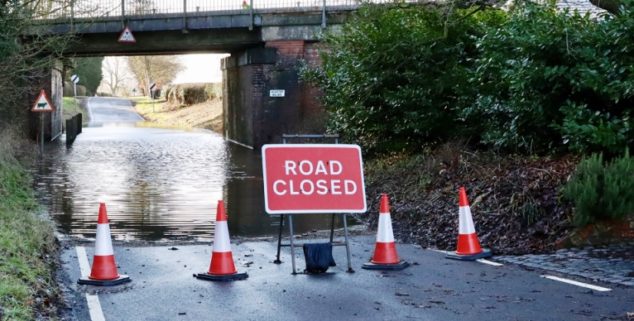Opinion
Opposition brewing to Sacramento storm water tax
 A warning sign blocks motorists from entering an area flooded by storm water. (Photo: Yorklass, via Shutterstock)
A warning sign blocks motorists from entering an area flooded by storm water. (Photo: Yorklass, via Shutterstock)We strongly suspect that readers of this column are stunned to see the authors’ names together as coauthors. One of us is a conservative taxpayer advocate and the other is a Democratic political consultant.
What unites us is our opposition to the City of Sacramento’s proposed storm water tax. Here’s some background.
First, the taxpayers in Sacramento generate over half a billion dollars in tax revenue for city services. These taxes include property taxes, sales taxes, utility user taxes and the Measure U tax.
Local governments, and especially Sacramento, have a history of neglecting infrastructure and instead fund fancy new projects or programs until roads, sidewalks, and sewers start to fall into disrepair.
On top of that, if you look at your property tax bill you will see a list of “below the line” items that include flood control assessments, lighting and landscaping assessments, Mello-Roos taxes (in many neighborhoods) and a litany of other miscellaneous fees, charges, taxes, and assessments.
Second, this is a bad time to propose a new tax. Although the pandemic appears to be subsiding, the city’s economy is still weak. One third of SMUD customers are either behind or have stopped paying their bills altogether. And small family businesses are still closing their doors. Inflation is raging. This proposal has been kicking around for years, but city leaders seemingly can’t read the room that homeowners, renters and businesses are struggling.
Third, neither of us dispute the need to upgrade the City’s storm water system because both age and deterioration have taken a toll. But local governments, and especially Sacramento, have a history of neglecting infrastructure and instead fund fancy new projects or programs until roads, sidewalks, and sewers start to fall into disrepair. It is only then they run to taxpayers for more money. We believe that historic neglect and lack of prioritization shouldn’t be rewarded.
Fourth, this is a highly regressive tax falling disproportionately on the shoulders of the working poor and the middle class. And if renters think that landlords won’t pass this increased tax along to tenants, they’re kidding themselves.
Fifth, this “ballot process” is not an election run by the County Registrar of Voters but by the city. We’re not conspiracy theorists, but there is no doubt that the folks overseeing the “election” are not neutral in their stance. For example, only by carefully reading the material accompanying the ballot are property owners fully aware of how much they will personally be paying. The question remains: is the information provided with the ballots really objective?
Lastly, in a rare display of bipartisanship, Congress passed billions in funds exactly for these types of projects. This new “fee” was proposed before that was a gleam in the eye of the city bureaucrats.
Here’s the bottom line: The City of Sacramento has simply failed to make its case for a new tax on property owners at this inopportune time and, moreover, that there are no alternatives to financing the intended projects.
—
Editor’s Note: Jon Coupal is the president of the Howard Jarvis Taxpayers Association, California’s largest taxpayer advocacy organization. Steven Maviglio is the principal of the Sacramento-based Forza Communications, a strategic communications firm specializing in political and legislative campaigns.
Want to see more stories like this? Sign up for The Roundup, the free daily newsletter about California politics from the editors of Capitol Weekly. Stay up to date on the news you need to know.
Sign up below, then look for a confirmation email in your inbox.

Leave a Reply